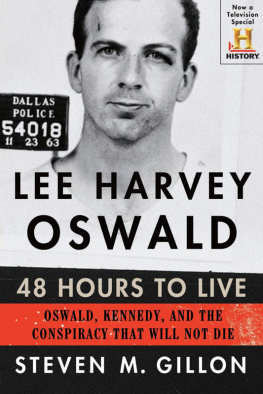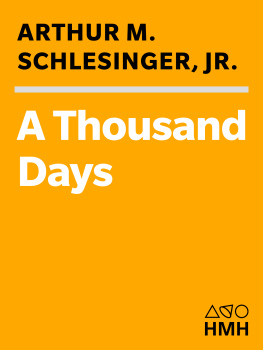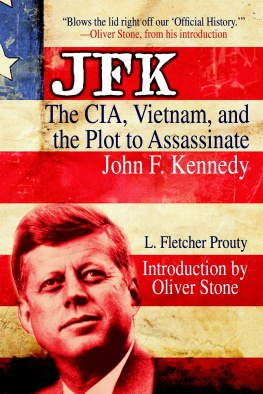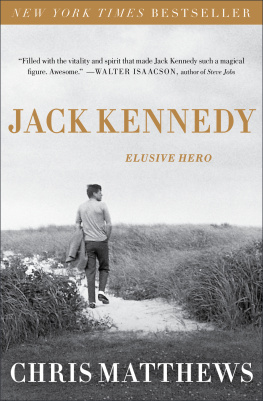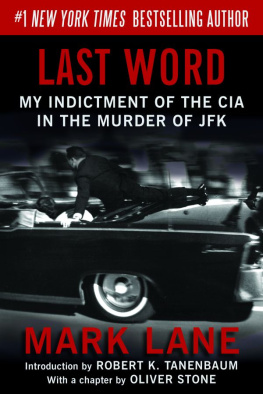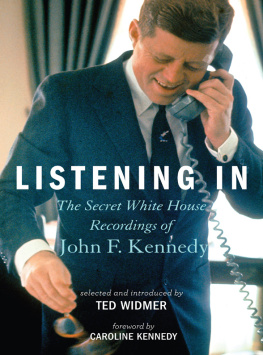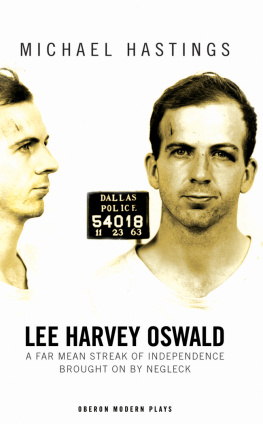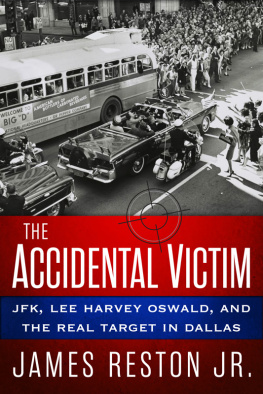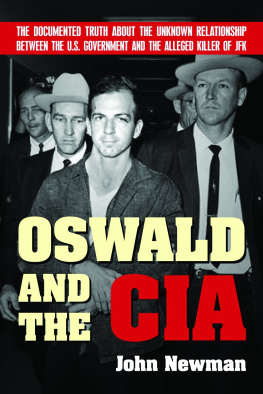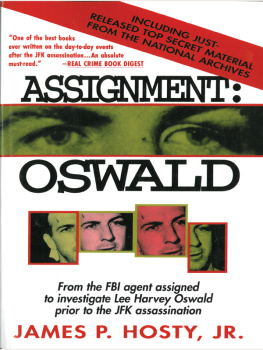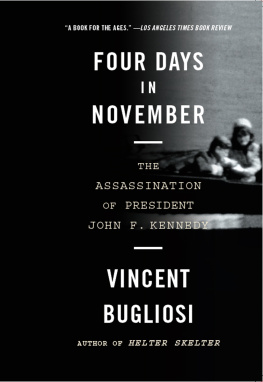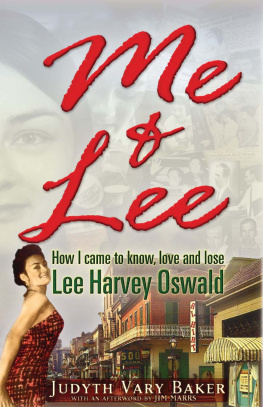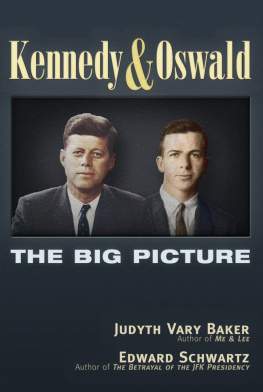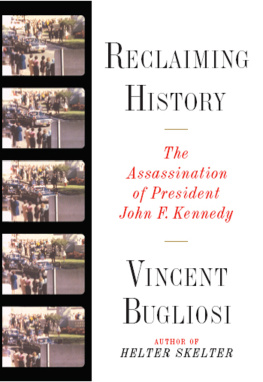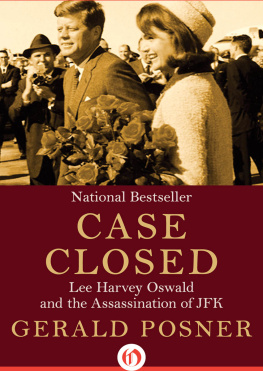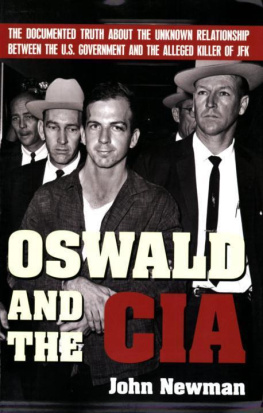
OTHER BOOKS BY STEVEN M. GILLON
Pearl Harbor: FDR Leads the Nation into War
The Kennedy Assassination24 Hours After
The Pact: Bill Clinton, Newt Gingrich, and the Rivalry
That Defined a Generation
10 Days That Unexpectedly Changed America
Boomer Nation: The Largest and Richest Generation and
How It Changed America
The American Paradox: A History of the United States Since 1945
The American Experiment: A History of the United States (vol. II)
Thats Not What We Meant to Do: Reform and
Its Unintended Consequences in Twentieth-Century America
The Democrats Dilemma: Walter F. Mondale and the Liberal Legacy
Politics and Vision: The ADA and American Liberalism, 19471985
LEE HARVEY
OSWALD
48 HOURS TO LIVE
OSWALD, KENNEDY, AND THE
CONSPIRACY THAT WILL NOT DIE
STEVEN M. GILLON
Scholar-in-Residence, HISTORY
Professor of History, University of Oklahoma



STERLING and the distinctive Sterling logo are registered trademarks of Sterling Publishing Co., Inc.
HISTORY and the H logo are trademarks of A&E Television Networks, LLC All rights reserved.
2013 by FernStreet, Inc.
All rights reserved. No part of this publication may be reproduced, stored in a retrieval system, or transmitted in any form or by any means (including electronic, mechanical, photocopying, recording, or otherwise) without prior written permission from the publisher.
ISBN 978-1-4549-1269-9
Book design by Barbara Aronica-Buck
For information about custom editions, special sales, and premium and corporate purchases, please contact Sterling Special Sales at 800-805-5489 or specialsales@sterlingpublishing.com.
2 4 6 8 10 9 7 5 3 1
www.sterlingpublishing.com
The book is dedicated to the Briarcliffe Athletic Association, and to all of the coaches, especially John Crossan, who made my childhood summers so magical and so meaningful.
ACKNOWLEDGMENTS
I could not have written this book without the support of the University of Oklahoma, the insight of many scholars and investigative journalists, and the encouragement of friends.
Gary Ginsberg read an early version of the book and offered a mix of thoughtful commentary and friendly encouragement.
Two graduate students at the University of Oklahoma were especially helpful. Eric England combed through thousands of pages of Warren Commission testimony and exhibits, providing me with a constant stream of information. Doug Miller offered his incisive commentary on an early draft.
At HISTORY, my thanks to Kate Winn for agreeing to publish the book and to David Wilk for pulling it all together, and for doing so in record time.
The talented filmmaker Anthony Giacchino has once again turned written words into powerful images for a HISTORY documentary. My thanks to associate producer R. Scott Frawley for tracking down pictures and artifacts for the project.
As always, Im grateful to Abbe Raven and to Nancy Dubuc for all the opportunities they have provided me at the network.
CONTENTS
In October 1997, John F. Kennedy Jr. traveled to Havana to interview Cuban leader Fidel Castro for a feature in his new magazine, George. John often interviewed important historical figures for the magazine, but this interview was unlike any other. Castro sat down at a table and, with only an interpreter in the room, launched into a four-hour monologue about everything from the U.S. embargo, to civil rights, to world revolution. John never had a chance to utter a word. He listened; Castro lectured. John tuned Castro out in the first few minutes.
The most revealing part of the meeting took place after the formal session had ended. As the two men exchanged farewells, Castro finally dropped his guard and tried to engage John in an informal, albeit, awkward, conversation. How tall was your father? Castro asked. Was he as tall as you? John, who was just a few days short of his third birthday when his father was assassinated, often confused his own memories of his father with the thousands of photos he had seen growing up. I dont know, he responded. Knowing that Castro was his fathers contemporary, John retorted: You tell me.
As John was speaking, Castro moved closer, placed his hand on Johns shoulder and leaned in as if he were about to share a secret. You know, he said without prompting, I could not have allowed Oswald into my country. Almost begging for John to acknowledge what he had just heard, Castro said: You know that, dont you? John did not say how he responded, but he thanked Castro for his time, shook his hand, and quickly made his way back to the United States.
Afterward, John interpreted Castros comment as an awkward way of reassuring him that the Cubans had not been involved in his fathers assassination. Not only was Oswald not a Cuban agent, he was not even welcome to enter the country. John, who rarely spoke about his fathers death, seemed, on the surface at least, willing to accept Castro at his word. (In the fifteen-plus years that I knew him, John made only one passing mention of the conspiracy theories surrounding his fathers death. Bobby knew everything, he cryptically stated, suggesting that his uncle knew things that no one else did.)
But Castros comments are revealing on another level. American intelligence knew that a few weeks before the assassination Oswald had traveled to Mexico City where he bounced back and forth between the Cuban and Soviet embassies begging for an entrance visa. Both governments gave him the runaround and refused his request. It had long been speculated that while at the Cuban embassy Oswald threatened to kill President Kennedy. What has never been clear was whether the Cubans took those threats seriously. Castros confession to John seems to confirm that the threat made its way all the way up the chain of command to Castro himself, and that the Cuban leader personally made the decision to deny a visa to the future assassin. Recent revelations lend further support to those claims.
Why are these revelations important? The new information about a possible, though tenuous, connection between Cuban intelligence and Oswald may help us understand his motives. They do not, as many conspiracy theorists have tried to assert, prove that Castro and the Cuban intelligence community masterminded the Kennedy assassination. Quite the contrary Castro was too shrewd, and too masterful at the art of selfpreservation, to conspire to assassinate the President of the United States. The retribution for such actions would have been devastating to him and to the revolution he so cherished. As Castro told John, he considered Oswald too much of a risk, but in recent years credible evidence has emerged that freelancing Cuban intelligence officials may have fanned Oswalds assassination fantasies.
Five decades after the assassination many Americans are still skeptical of the Warren Commission conclusion. Polls show that a majority of Americans, swayed by a vast army of conspiracy books and propaganda, refuse to believe that Oswald acted alone.
Next page
